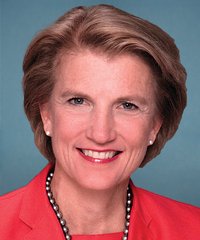
West Virginia Senator Shelley Moore Capito believes that today's challenges demand bipartisan solutions. She supports commonsense policies that promote economic growth, unleash energy potential, lift up working families, and build a better West Virginia for the next generation.
From growing up in Glen Dale in the Northern Panhandle, to representing the 2nd Congressional District from the Ohio River up to the Eastern Panhandle, to raising her family in Charleston, Shelley knows the ins and outs of every region of the state. Early in life, Shelley saw how her father, Governor Arch Moore Jr., instituted changes to improve West Virginia—building up not only infrastructure and the economy but also families and state pride. It’s that mindset that inspires her work today.
As the ranking member of the Environment and Public Works (EPW) Committee, Senator Capito is working every day at the intersection of energy, environment, and the economy. By effectively making use of our natural resources in West Virginia and across our nation, we can create and secure jobs, enhance our national security, and make America less reliant on foreign energy sources. Senator Capito believes in an all-of-the-above energy policy focused on reliably meeting consumer demand, creating quality jobs, and being responsible stewards of the environment through responsible regulation.
After working with President Trump to roll back several of the untenable regulations put forth during the Obama administration’s War on Coal that has reemerged under President Biden, Senator Capito continues to support the West Virginia coal industry, particularly supporting investments in new markets for coal, including carbon manufacturing and extracting rare earth elements essential to our high tech and defense sectors.
West Virginia is also blessed with vast reserves of natural gas, being situated atop the Marcellus and Utica shales. Senator Capito is committed to seeing the buildout of the complete value chain for natural gas and petrochemical manufacturing in the state, particularly in the Northern Panhandle. Private sector and government studies predict the development of a regional market for natural gas liquids in Appalachia would generate billions of dollars in capital investment, create tens of thousands of jobs, and revitalize the region’s manufacturing and chemicals industries, with enough scale to meet growing domestic and international demand for these products.
Senator Capito is a leader in Congress on carbon capture technology development, working in a bipartisan fashion to enact the FUTURE Act — which expanded and improved the 45Q carbon capture, utilization, and storage (CCUS) tax credit — and crafting the USE IT Act to reduce regulatory barriers to deployment of CCUS technology, which is essential to meeting environmental goals while also preserving and creating jobs.
Once it was recognized that “forever chemicals” known as per- and polyfluoroalkyl substances (PFAS) contaminated communities in West Virginia, Senator Capito aggressively pushed the Environmental Protection Agency (EPA) to regulate PFAS contaminant levels in drinking water and prevent future emissions of the chemicals, including introducing several pieces of bipartisan legislation. The EPA announced their plan to implement via regulation Senator Capito’s PFAS drinking water standard legislation in February 2020.
Senator Capito wants West Virginia to remain “wild and wonderful.” As a lover of the outdoors and an appropriator, Senator Capito has continually funded the Land and Wildlife Conservation Fund (LWCF). Additionally, she has advocated for permanent authorization of LWCF with a dedicated funding stream. Senator Capito also supports the Restore Our Parks Act, legislation that would address the National Park Service’s $12 billion maintenance backlog. Improving the quality of experiences on public lands while meeting conservation goals are key to growing West Virginia’s outdoor recreation and tourism economy, while preserving our natural beauty and sportsmen’s heritage for future generations. Her legislation to designate New River Gorge as a national park and preserve was signed into law in 2020, making West Virginia home to the nation's newest, 63rd national park and 20th national preserve.